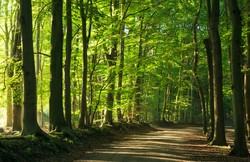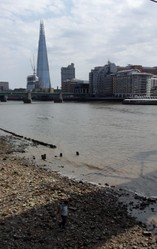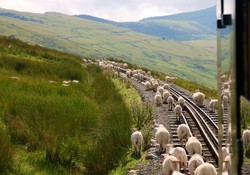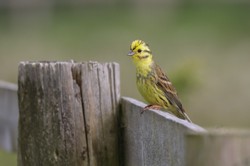Macfarlane returns to one of his interests, the Chideock Martyrs. He has spoken of these Catholics executed in the Reformation period in other books, and it is heartening to see that to this scholarly writer their bravery is neither forgotten nor dismissed, and he recounts something of their story, which is worth remembering. He tells again of his visit to the Catholic chapel in Chideock and how he spent some time there. We can feel his sympathy for forgotten heroes of a cruel age.
The sense of walking through time is powerful in Macfarlane's works. He speaks of holloways being places where you can slip back out of this world, and their being places within which ghosts softly flock. The supernatural is a constant background in this book. He speaks of walkers on ancient ways sensing the sounds and voices of an earlier age, and he tells how he sometimes thought he saw Roger Deakin at places on the path. He is convinced that places retain memories of the people who walk along them, even from distant times. This author is one who is open to the sense or presence of what Celtic folk call The Other, and this liberates him and the reader from the rigid constraints of materialism and its denial of anything other than the merely material.
Macfarlane's command of literature shines through in his writings. He regularly speaks of the poet, Edward Thomas, on whom he is a specialist, and whose thoughts and experiences he values. Holloway also was inspired by the book Rogue Male, by Geoffrey Household, who sets the adventures of his hero, who is escaping from killers by hiding out in the holloway that Macfarlane is exploring. He draws comparisons with Kipling's The Road Through the Woods, and the comparison with this slightly spectral poem fits well with Macfarlane's thinking and sensitivity to The Other.
You get the sense of living in an anomaly. These holloways are sometimes impassable, because they are overgrown, too narrow for modern vehicles and yet at eighteen feet deep in some cases, too deep to be economically filled in by farmers. Thus they remain, the lingering echoes of an ancient past. Macfarlane allows us to peek into one.









 Pilgrimage. A review19 days ago
Pilgrimage. A review19 days ago
 Leo the Fourteenthon 05/09/2025
Leo the Fourteenthon 05/09/2025
 The Melsonby Hoardon 03/25/2025
The Melsonby Hoardon 03/25/2025




Comments
Cafes can be indoor or outdoor. To here is no rule onnthe subject.
Thank you for your comment below on Apr 12, 2024, in answer to my previous-day observation and question Apr 11, 2024.
The last paragraph advises us that "This is a small, easily affordable work which you can tuck into a pocket for reading on bus, tram or train. After purchasing I sat in a cafe drinking tea and savouring the first section, re-reading to absorb fully the rich language in which this Cambridge English scholar is so adept. This is a book whose language invites you to return to it.Holloway is a book written by a deeply literate and spiritually sensitive person. It is worth purchasing."
A café is sometimes sidewalk, likelier indoor or under an outdoor, roofed, walled patio-like extension open-air between roof and wall in the United States.
Is a café always outdoor or sometimes indoor for British-Isles-ers?
There is no set figure for width, but they are generally v shaped. I would estimate a width of about twenty feet at the top to be the norm.
The introductory paragraph describes some holloways as 18 feet (5.4864 meters) deep.
Do they have some expectable width?
There are a large range of gains, depending upon which botanicals are used.
Thank you!
It's helpful to have such a clear definition so I won't make that mistake ever again.
As a non-gin, non-liquor, non-vodka drinker, I won't be thinking that gin and vodka are separate, not somewhat related, choices.
In the context of retail shop and store are used interchangeably.
As.far as I know there is no custom in this matterp Of gin and vodka . Gin is merely vodka infused with botanicals. I once had some lovely gin made from vodka with herbal infusions added. I was not the maker, but simply the consumer.,
Your answer inspires two questions.
The first is contextual, grammatical, vocabulary-related. This, western side of the (Atlantic) pond mentions alcoholic-beverage, clothing, grocery, hardware, toy stores but bridal shop and chocolate shop.
Is shop used about a specialty business or is it used interchangeably with store over on your, eastern (Atlantic) pond side?
Also, you mention Damson juice with vodka. Online sources through the Unitedstatesian web note damson with gin in home-spirits-making.
Would Damson go with vodka preferentially over gin in the United Kingdom?
Probably shop bought. In the UK making your own spirits is subject to tight laws and you need a licence. There is an easy and legal way. Buy a bottle of vodka and flavour it with Adamson juice,
I have made wine, but never spirits. Nor have I ever brewed beer, as I don't like it much.ĺ
The last sentence in your first subheading, The Holloway, ends with a mention of damson gin.
Online sources identify it as popular with those who home-make their beer, liquor and wine.
Would it have been home-made or store-bought in the book?
Would home-making damson gin be one of your many culinary and cultivationary talents?